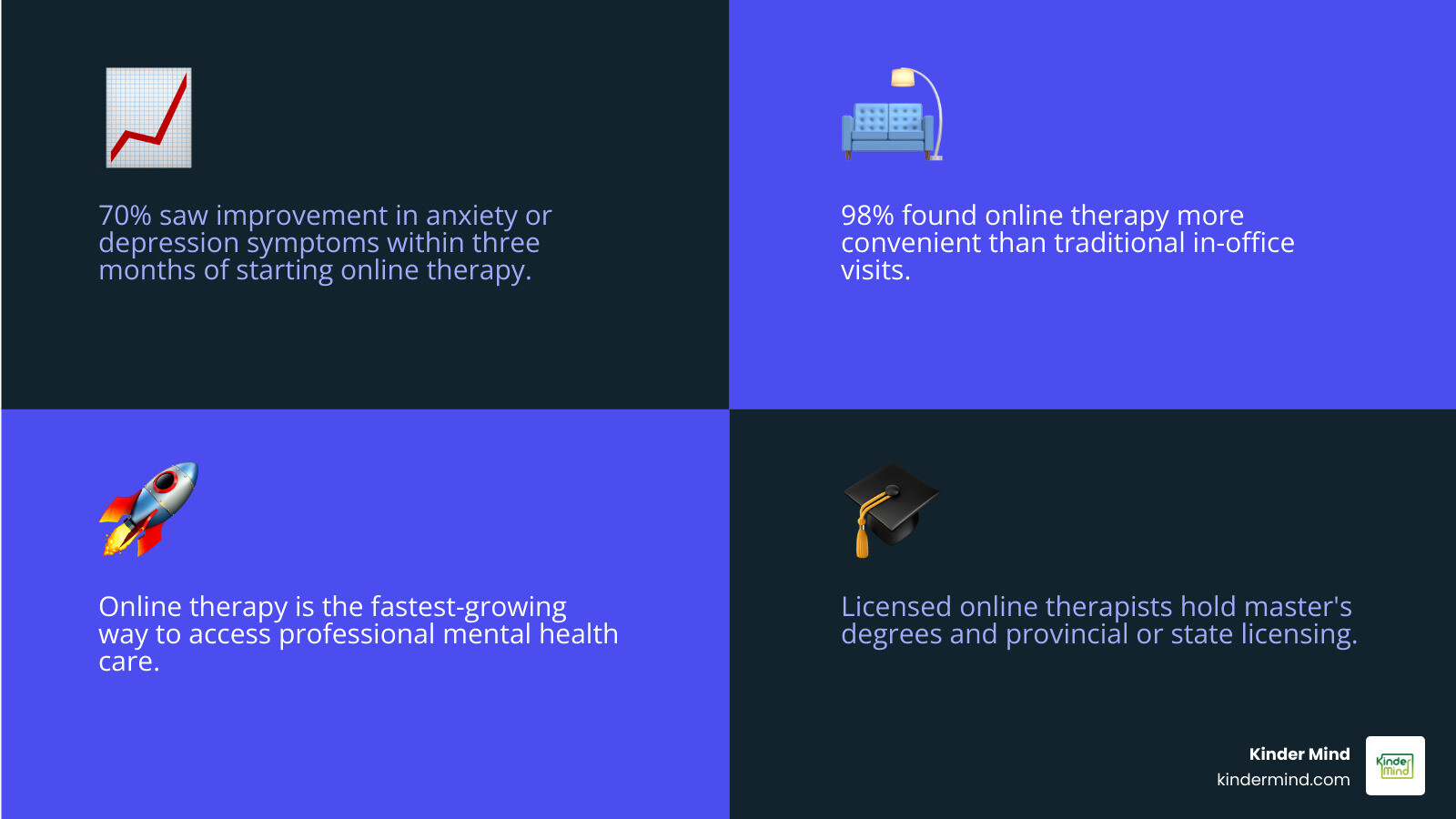Your Guide to Online Counseling: Services That Deliver Real Support
Why Online Counseling is Changing Access to Mental Health Support

Online counseling is professional mental health therapy delivered through the internet. If you've ever struggled with the cost and logistics of traditional counseling, you're not alone. Virtual therapy has become a popular and effective way to access mental health care, offering a convenient and dependable alternative to in-office visits.
Through secure video calls, phone sessions, or messaging, you can connect with a licensed therapist from the comfort of your home. It's designed for adults seeking support for common concerns like anxiety, depression, stress, and relationship issues. Research shows it's just as effective as in-person therapy for most conditions, with studies indicating that 70% of people see improvement in symptoms within three months. Plus, 98% of users find it more convenient than traditional therapy.
The appeal is simple: no commute, flexible scheduling, and access to specialists regardless of your location. However, it's not suitable for severe mental health crises, suicidal ideation, or court-ordered therapy.
Convenience doesn't mean sacrificing quality. Online therapists are licensed professionals—psychologists, social workers, or counselors with master's or doctoral degrees, extensive experience, and state licensing. This guide will walk you through how online counseling works, how to find a qualified therapist, manage costs, and prepare for your first session.

Understanding Online Counseling: How It Works and Its Benefits
At its core, online counseling is professional mental health support delivered through a screen. You connect with a licensed therapist using a computer, tablet, or smartphone to work on challenges like anxiety, relationship struggles, or grief. This shift to virtual sessions removes common barriers, such as taking time off work or worrying about privacy in a waiting room. The foundation of effective therapy—a real connection with a qualified professional—remains the same; technology is just the bridge. For a closer look at this approach, explore our page on Online Therapy.

What are the different types of online therapy modalities?
Online therapy offers flexible communication styles to meet your needs.
- Video conferencing: This is the most common format, closely mimicking an in-person session. Seeing your therapist allows for non-verbal cues like body language and facial expressions, which can strengthen the therapeutic connection.
- Live chat: Real-time text-based sessions are ideal for those who express themselves better in writing or prefer not to be on camera. It can make it easier to discuss difficult topics.
- Asynchronous messaging: This format allows you to write to your therapist anytime, and they respond within an agreed-upon timeframe. It's perfect for busy schedules or for those who like to reflect before and after communicating.
- Phone calls: For those who prefer to talk without video, phone sessions offer privacy and eliminate any camera-related anxiety. You can even take a walk during your session.
The right modality depends on your comfort level and needs. To learn more about these options, our insights on Virtual Therapy can provide additional guidance.
What are the main benefits compared to traditional therapy?
Online counseling expands access to mental health care, making it a viable option for many who might otherwise struggle to get support.
- Convenience: Eliminating the commute saves significant time and energy, which is especially helpful when dealing with conditions like depression or anxiety.
- Accessibility: It opens up options for people in rural areas, those with mobility challenges, or parents with demanding schedules. The geographical barrier to finding a qualified therapist is removed.
- Reduced Stigma: Receiving therapy from the privacy of your home can make the first step feel less daunting for those worried about the stigma of seeking help.
- Flexibility: Many online therapists offer evening or weekend appointments that are rare in traditional office settings. This allows therapy to fit into your life, not the other way around.
- Comfort: Being in your own familiar environment can make it easier to open up about difficult topics. You're in control of your space, which can foster a sense of safety and authenticity.
Is Virtual Therapy the Right Choice for Your Mental Health Needs?
Online counseling is highly effective for many, but it's not a universal solution. Understanding its strengths and limitations is key to deciding if it's right for you. The evidence is strong: scientific research on the efficacy of online therapy shows that for most common mental health concerns, virtual sessions deliver results comparable to face-to-face therapy. The key ingredients for success are the same: a skilled therapist, a strong therapeutic connection, and your commitment to the process.
What types of mental health issues can be addressed?
Online counseling is well-suited for a wide range of common mental health challenges.
- Anxiety: Whether you're dealing with generalized worry, social anxiety, or panic attacks, therapists can teach you techniques like cognitive behavioral therapy (CBT) virtually. Learn more on our Online Therapy for Anxiety page.
- Depression: When low energy makes leaving the house difficult, online therapy provides accessible support to help you untangle negative thought patterns and rebuild a sense of hope. Explore our Online Therapy for Depression resource.
- Relationship challenges: Couples Therapy can be conducted from your living room, helping you steer communication issues or feelings of disconnection. Individual therapy for relationship concerns is also highly effective online.
- Grief and loss: Processing painful emotions from the privacy of your own space can provide a sense of safety and comfort during difficult times.
- Trauma: Many individuals can effectively work through trauma online with therapists trained in trauma-informed care, who can help you process experiences at a manageable pace.
Virtual therapy also supports people with stress management, self-esteem issues, parenting challenges, and personal growth.
What are the limitations or contraindications for online therapy?
It's important to recognize when online counseling is not the appropriate choice.
- Severe mental health crises: If you are experiencing active suicidal thoughts, psychosis, or another acute mental health emergency, you need immediate, in-person care. Please call 911 or go to the nearest emergency room. Online therapy is not for crisis intervention.
- Severe mental illnesses: Conditions requiring intensive support and medical monitoring, such as acute bipolar disorder or severe eating disorders, are better treated in person.
- Court-ordered therapy: Most online platforms are not equipped to handle the specific reporting and documentation requirements of legally mandated therapy.
- Practical barriers: A reliable internet connection and a private, confidential space are essential for effective online therapy. If you lack either, it can be difficult to engage fully in the process.
- Technology challenges: While platforms are generally user-friendly, a basic comfort with technology is needed. Significant stress over using the technology can interfere with the session.
Online counseling is a powerful tool, but for those in crisis or with severe instability, alternative forms of support are necessary. A good therapist will help you determine if virtual sessions are the right fit for your situation.
Your Guide to Finding and Affording Quality Online Counseling
Finding the right therapist is easier than ever with online counseling. You're no longer limited to professionals in your immediate area, giving you a better chance of finding someone who specializes in your specific needs. The key is knowing where to look and what to look for.
How do I find a qualified and licensed online therapist?
Several resources can help you find a great therapist with confidence.
- Professional directories: Platforms like Psychology Today allow you to filter therapists by location, specialty, insurance, and whether they offer virtual sessions. Their detailed profiles give you a sense of their approach before you even reach out.
- Your insurance provider: Check your insurance company's list of in-network therapists who offer online counseling. This can save you time and money by focusing on pre-approved providers. For more guidance, see our resource on Online Therapy That Takes Insurance.
- Professional associations: Organizations like the American Psychological Association (APA) or the National Association of Social Workers (NASW) have directories of licensed members who meet strict professional standards.
- Targeted platforms: Kinder Mind offers a curated list of Our Therapy Providers to help you connect with qualified professionals who fit your needs.
Many therapists offer a free initial consultation to see if you're a good fit. Trust your gut—the therapeutic relationship is crucial. For more tips, visit our page on Find a Therapist Near Me.
What should I look for in an online therapist's credentials?
Verifying a therapist's qualifications is essential for ensuring you receive quality care.
- Licensing: This is non-negotiable. Your therapist must be licensed to practice in your state. Common licenses include Licensed Professional Counselor (LPC), Licensed Clinical Social Worker (LCSW), and Psychologist (PsyD or PhD).
- Education: Look for a therapist with at least a master's degree in a mental health field. Psychologists will have a doctoral degree.
- State Registration: Licensing ensures the therapist is accountable to a state regulatory board that upholds professional and ethical standards.
- Specializations and Experience: Find a therapist whose experience aligns with your needs, whether it's anxiety, trauma, or relationship issues. Reputable therapists typically have several years of post-licensure experience.
What are the costs of online counseling and is it covered by insurance?
Understanding the cost of therapy can make it feel much more manageable.
- Session Costs: The price of online counseling varies but is often competitive with in-person therapy. Rates depend on the therapist's credentials, experience, and location.
- Insurance Coverage: Most major health insurance plans now cover teletherapy. Check with your provider to understand your benefits. Our Insurance Eligibility Check tool can also help clarify your coverage.
- Sliding Scale Fees: If you don't have insurance, many therapists offer reduced rates based on your income. Don't hesitate to ask if this is an option.
- HSA/FSA: Health Savings Accounts (HSAs) and Flexible Spending Accounts (FSAs) allow you to use pre-tax dollars for mental health services, which can result in significant savings.
- Employer Benefits: Check if your employer offers an Employee Assistance Program (EAP), which may provide free or subsidized therapy sessions.
Preparing for Success: Your First Session and Key Considerations
Starting online counseling can be both exciting and nerve-wracking. A little preparation can help you feel more confident and ensure your first session is productive. This involves setting up your physical space, checking your technology, and understanding how privacy is protected in a virtual setting.
How can I prepare for my first online therapy session?
Set yourself up for a meaningful first session with these simple steps.
- Find a private space: This is the most critical step. You need a place where you can speak freely without being overheard, whether it's a home office, a bedroom, or even your parked car.
- Test your technology: A few minutes before your session, check your internet connection, camera, and microphone. Ensure your device is charged. Using headphones can improve sound quality and add privacy.
- Minimize distractions: Turn off notifications on your phone and computer. Let others in your home know you need uninterrupted time.
- Jot down your thoughts: If you're nervous, write down a few reasons you're seeking therapy or questions you have for your therapist. This can serve as a helpful guide during the session.
- Prepare questions for your therapist: It's perfectly fine to ask about their experience, approach, and how they measure progress. This helps you determine if they're the right fit.
- Be open and honest: Therapy is most effective when you're authentic. You don't have to share everything at once, but being genuine about your struggles will help your therapist support you.
How is privacy and confidentiality maintained in online therapy?
Reputable therapists and platforms take your privacy very seriously. The ethical and legal obligations to protect your information are just as strong as in traditional therapy.
- HIPAA Compliance: In the United States, the Health Insurance Portability and Accountability Act (HIPAA) sets strict standards for protecting your health information. Therapists and platforms must follow these legal requirements.
- Encrypted Platforms: Reputable online counseling services use encrypted video and messaging channels. This scrambles your data, making it unreadable to anyone who might intercept it.
- Informed Consent: Before you begin, your therapist will explain how your information is protected and the limits of confidentiality (e.g., risk of harm to self or others, suspected child abuse, or a court order).
- Shared Responsibility: Your therapist will use secure devices and conduct sessions from a private location. You can do your part by using a private network and finding a confidential space for your sessions.
For more details, you can review our Privacy Policy.
What are the legal and regulatory considerations for online therapists?
A strong legal framework protects you when you engage in online counseling.
- Licensing Jurisdiction: A therapist must be licensed in the state where you are physically located during the session. This ensures they are accountable to your state's laws and professional standards.
- Professional Guidelines: State licensing boards and national organizations like the American Counseling Association (ACA) provide detailed guidelines for virtual care, covering everything from security to professional ethics.
- Mandated Reporting: All licensed therapists are legally required to break confidentiality in specific situations involving imminent harm to self or others, or suspected child or elder abuse. Your therapist will explain these limits to you.
Frequently Asked Questions about Online Therapy
It's natural to have questions about online counseling. Here are answers to some of the most common inquiries to help you feel more informed.
How effective is online therapy compared to in-person therapy?
This is a top concern for many, and the research is overwhelmingly positive. Numerous studies show that for common issues like anxiety, depression, and stress, online counseling is as effective as traditional in-person therapy. The key to success in any therapy modality is the therapeutic alliance—the bond of trust between you and your therapist. Many clients find they feel more comfortable and open online, which can actually strengthen this connection and lead to great outcomes.
What role do technology and internet connection play?
In online counseling, technology is the bridge connecting you to your therapist, so its reliability is key.
- A stable connection is crucial: A strong internet connection prevents disruptive freezes or dropped calls that can interrupt the therapeutic flow.
- Video quality matters: High-quality video allows both you and your therapist to pick up on non-verbal cues like facial expressions, which enriches communication.
- A distraction-free environment is best: Turning off notifications and closing other tabs on your device helps you stay present and focused during your session.
A basic comfort level with technology is helpful. A quick test run before your first session can prevent technical stress and ensure a smooth experience.
Are there specific resources for finding online therapy in the US?
Yes, there are many excellent resources to help you find qualified online therapists in the United States.
- National Helplines and Directories:
- SAMHSA's National Helpline: A free, confidential, 24/7 treatment referral and information service for individuals and families facing mental and/or substance use disorders. Call 1-800-662-HELP (4357) or visit their online treatment locator.
- National Alliance on Mental Illness (NAMI): Offers support, education, and advocacy, along with a helpline that can provide information and resources. Visit NAMI.org for local chapters and support.
- Psychology Today: A widely used directory that allows you to search for therapists by location, insurance, specialty, and more, with specific filters for teletherapy.
- State Licensing Boards: Each state has a licensing board for counselors, social workers, and psychologists. Their websites often have a directory or license verification tool to find qualified professionals in your state.
- Specialized Platforms: Many online platforms, including Kinder Mind, connect you directly with licensed therapists who are authorized to practice in your state, ensuring they meet all local regulations and ethical standards.
Conclusion
Exploring your options for online counseling is a significant step toward prioritizing your mental health. It has transformed access to support, becoming a primary and effective choice for millions.
We've covered how online therapy offers unparalleled convenience and flexibility without sacrificing quality. For most common mental health concerns—like anxiety, depression, and stress—it is just as effective as in-person sessions. While it's not for acute crises, it removes barriers like travel and scheduling conflicts that once made therapy feel out of reach.
Finding a qualified, licensed therapist is more straightforward than ever through online directories, professional associations, and your insurance provider. With expanding insurance coverage and other payment options, quality care is increasingly affordable. Your privacy is protected by strict legal standards like HIPAA and secure, encrypted platforms.
The success of therapy hinges on the therapeutic relationship. The connection you build with your therapist is what drives healing, and many people find it easier to open up from the comfort of home.
Taking the first step is an act of strength. At Kinder Mind, we believe mental health care should be accessible to everyone. We offer both in-person and virtual therapy services across numerous states, with flexible payment options to reduce barriers to care. You don't have to figure this out alone. The right support is more accessible than ever.


